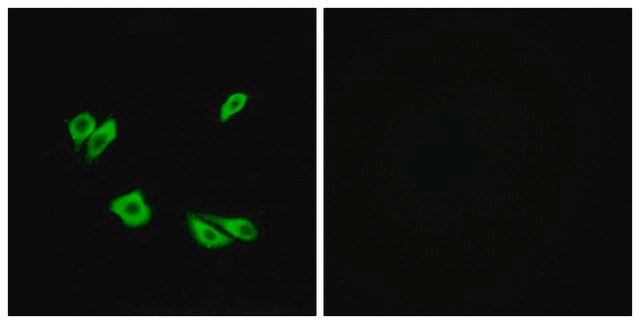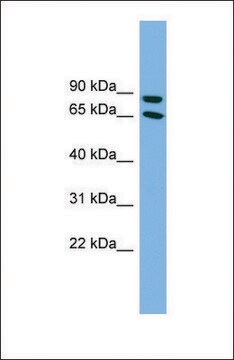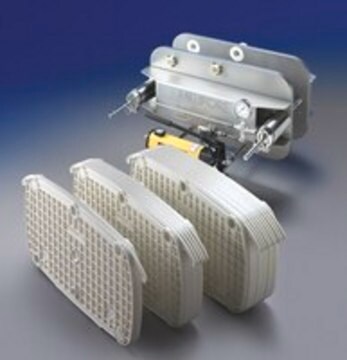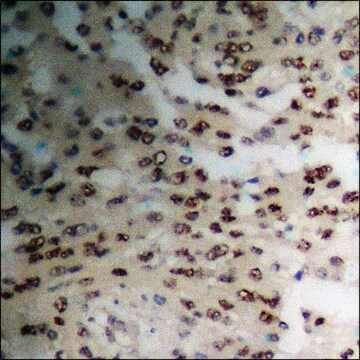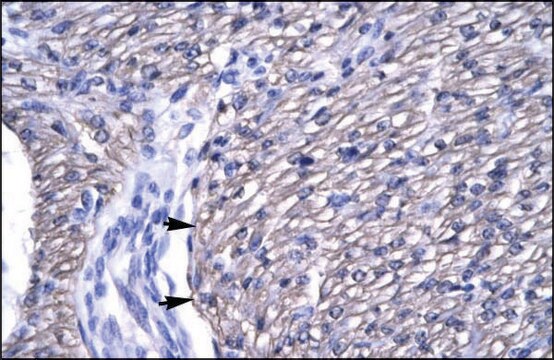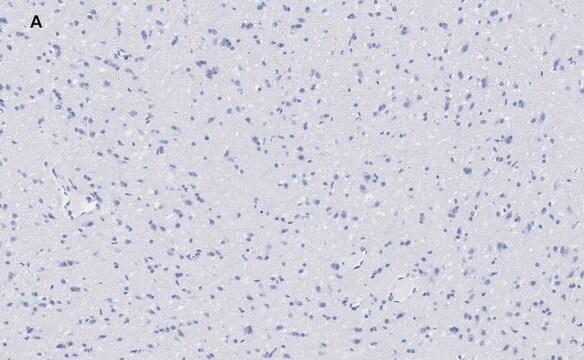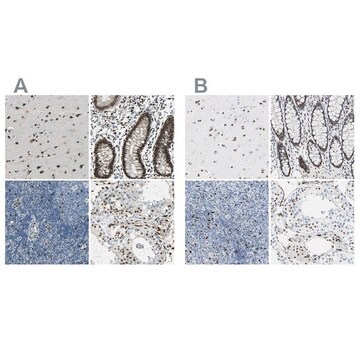AB5840-I
Anti-Dab1
from rabbit
Synonym(s):
Disabled homolog 1
Sign Into View Organizational & Contract Pricing
All Photos(2)
About This Item
UNSPSC Code:
12352203
eCl@ss:
32160702
NACRES:
NA.41
clone:
polyclonal
application:
IHC
WB
WB
species reactivity:
mouse
technique(s):
immunohistochemistry: suitable (paraffin)
western blot: suitable
western blot: suitable
citations:
1
Recommended Products
biological source
rabbit
Quality Level
antibody form
affinity isolated antibody
antibody product type
primary antibodies
clone
polyclonal
species reactivity
mouse
packaging
antibody small pack of 25 μg
technique(s)
immunohistochemistry: suitable (paraffin)
western blot: suitable
NCBI accession no.
UniProt accession no.
shipped in
ambient
target post-translational modification
unmodified
Gene Information
mouse ... Dab1(13131)
General description
Disabled homolog 1 (UniProt: P97318; also known as DAB1) is encoded by the Dab1 gene (Gene ID: 13131) in murine species. Dab 1 is mainly expressed in the brain and serves as an adapter molecule involved in neural development where it is reported to direct the migration of cortical neurons past previously formed neurons to reach their proper layer. DAB1 is can be phosphorylated on Tyr198, Tyr220, and Tyr232 upon reelin induction in embryonic neurons. It can also be phosphorylated on Ser524, but this phosphorylation is independent of reelin signaling. Tyrosine phosphorylation of DAB1 by Src family tyrosine kinases is considered to be the most critical downstream event in Reelin signaling. DAB1 contains a phosphotyrosine interaction domain (PID) (aa 36-189), which specifically binds to the Asn-Pro-Xaa-Tyr(P) motif found in many tyrosine-phosphorylated proteins. Seven different isoforms of Dab1 have been identified that are generated via alternative splicing.
Specificity
This rabbit polyclonal antibody detects murine Disabled homolog 1 (Dab1). It targets an epitope within 156 amino acids from the C-terminal half.
Immunogen
GST-tagged recombinant fragment corresponding to 156 amino acids from the C-terminal half of murine Disabled homolog 1 (Dab1).
Application
Anti-Dab1, Cat. No. AB5840-I, is a highly specific rabbit polyclonal antibody that targets Disabled homolog 1 and has been tested in Immunohistochemistry (Paraffin) and Western Blotting.
Immunohistochemistry Analysis: A 1:250 dilution from a representative lot detected Dab1 in mouse cerebral cortex tissue sections.
Research Category
Neuroscience
Neuroscience
Quality
Evaluated by Western Blotting in mouse brain tissue lysate.
Western Blotting Analysis: 2 µg/mL of this antibody detected Dab1 in 10 µg of mouse brain tissue lysate.
Western Blotting Analysis: 2 µg/mL of this antibody detected Dab1 in 10 µg of mouse brain tissue lysate.
Target description
~64 kDa observed; 63.58 kDa calculated. Uncharacterized bands may be observed in some lysate(s).
Physical form
Affinity Purified
Format: Purified
Purified rabbit polyclonal antibody in buffer containing 0.1 M Tris-Glycine (pH 7.4), 150 mM NaCl with 0.05% sodium azide.
Storage and Stability
Stable for 1 year at 2-8°C from date of receipt.
Other Notes
Concentration: Please refer to lot specific datasheet.
Disclaimer
Unless otherwise stated in our catalog or other company documentation accompanying the product(s), our products are intended for research use only and are not to be used for any other purpose, which includes but is not limited to, unauthorized commercial uses, in vitro diagnostic uses, ex vivo or in vivo therapeutic uses or any type of consumption or application to humans or animals.
Not finding the right product?
Try our Product Selector Tool.
Certificates of Analysis (COA)
Search for Certificates of Analysis (COA) by entering the products Lot/Batch Number. Lot and Batch Numbers can be found on a product’s label following the words ‘Lot’ or ‘Batch’.
Already Own This Product?
Find documentation for the products that you have recently purchased in the Document Library.
Our team of scientists has experience in all areas of research including Life Science, Material Science, Chemical Synthesis, Chromatography, Analytical and many others.
Contact Technical Service